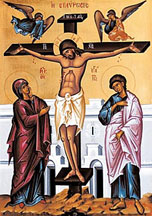In addition to the Vespers and the Orthros, the daily cycle of worship contains the Apodeipnon (Compline), the Midnight Service (Mesoniktikon) and the Service of the Hours. These latter services have their roots in the devotional practices of the early Christians, and especially in the communal worship of the monastic communities.
Each of the four Hours bears a numerical name, derived from one of the major daylight hours or intervals of the day as they were known in antiquity: the First – Proti – (corresponding to our sunrise); the Third – Triti – (our midmorning or 9 a.m.); the Sixth – “Ekti – (our noonday); and the Ninth -‘Enati(our midafternoon or 3 p.m.).
Each Hour has a particular theme, and sometimes even a subtheme, based upon some aspects of the Christ-event and salvation history. The general themes of the Hours are: the coming of Christ, the true light (First); the descent of the Holy Spirit (Third); the passion and crucifixion of Christ (Sixth); the death and burial of Christ (Ninth).
The central prayer of each Hour is the Lord’s Prayer. In addition, each Hour has a set of three Psalms, hymns, a common prayer (‘O en panti kairo), and a distinctive prayer for the Hour. Slight variations occur in the Service of the Hours on feast days as well as on fast days. For example, in the place of the regular troparia, the apolytikia of the feast are read; or in the case of the Great Fast, penitial prayers are added at the end.
A radical change in the Service of the Hours, however, occurs on Great Friday. The content is altered and expanded with a set of troparia and Scripture Readings (Prophecy, Epistle, and Gospel) for each Hour. In addition, two of the three Psalms in each of the Hours are replaced with Psalms that reflect themes of Great Friday. While the stable-fixed Psalm of the service reflects the theme of the particular Hour, the variable Psalms reflect the theme of the day. In their expanded version these Hours are called The Great Hours. They are also known as the Royal Hours. The services of the regular Hours are found in the Horologion. The Service of the Great Hours of Great Friday, however, is found in the Triodion.
Originally each Hour was read at the appropriate time of the day. In a second stage of development, the first Hour was attached to the Orthros, the Third and Sixth were read together in the late morning, and the Ninth preceded the Vespers. In a later development, the four Hours of Great Friday were grouped together and read in succession on the morning of Great Friday as a single office.


